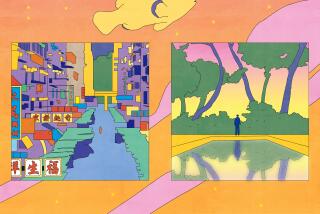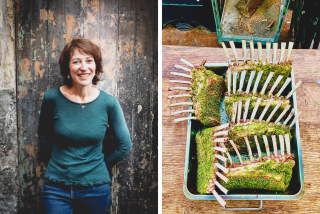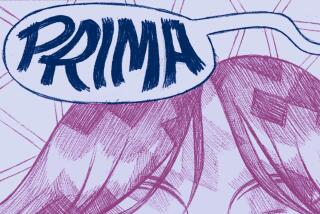Reaching Across Culture Gap: <i> Vive la Difference</i> !
- Share via
When we met, I thought he was American, he thought I was French.
We worked for the same company, only he was in New York and I in the Paris bureau.
When he visited the Paris office that day, he was tanned and blond and wore a nifty double-breasted navy blazer. Oh, super, an Ivy Leaguer, I presumed.
I had on a summery flowered dress picked up at a neighborhood boutique, and I could manage a demure “Bonjour” without an accent. Clearly, I was Parisian.
The impression lasted only a matter of seconds--he, indeed, was very French and I, very American.
It was our first cultural misconception, though, needless to say, there were many to follow.
We have been together now for almost two decades, living in both countries, learning each other’s customs.
Over the years our ideas have grown together; at times, I seem more French than he does; he more American than I.
Then there are the moments when it’s not like that a bit, when all the things other couples take for granted become incentives to national warfare for us.
Of our various battle grounds, our favorite has always been the dinner table. Considered a minor art by much of the world, eating in France is an essential act of culture. “Tell me what you eat and I will tell you who you are,” wrote Brillat-Savarin, the 18th-Century codifier of gastronomy.
Catalogue of Edibles
When a Frenchman returns from travels in a foreign country, his initial comments are not on the hardships of scaling the Himalayas, the beauty of the Parthenon at dawn or the breadth of the L.A. freeways, but a catalogue of local edibles swallowed by him and digested by his stomach.
And so, in the bicultural kitchen, a certain French chauvinism is inevitable.
There was, for instance, that early dinner when I was preparing Southern fried chicken. Proud of my regional specialty, I was stirring up a pan of rich brown gravy, mixing in the milk.
“Milk! Quelle horreur! “ shrieked my newly beloved. That’s for baby bottles. Practically poisonous after infancy. He grabbed the wine and poured in a purging torrent, turning my lovely sauce a deep, repulsive purple.
Any prospective spouse of a French man or woman also should be advised that checkered tablecloths and candlelight are largely American fabrications.
The French are more practical than romantic about their victuals: “For goodness sakes,” a Gallic mate is sure to rail. “Turn on the light! I can’t see what’s in my dinner plate.”
Forget the Romance
Speaking of romance, this is another appetite for which the French are famous, and about which there are rude surprises.
Your beau, you think, will gaze at you over champagne (we know now there will be no candlelight) and sexily murmur those gorgeous three words, Je t’aime.
Don’t count on it.
Add a beaucoup or bien. OK. But all alone, this means a serious oath of allegiance.
Why are Americans always saying “I love you”? Pierre asks. Hi, I love you. Bye, I love you. Good night, I love you.
Flirting is a different matter, however. A common saying goes, “The best moment of a love affair is climbing the stairs.”
What of Questions?
Knottier problems arise in the area of education. Education is, say the French, what remains when you’ve forgotten all of the rest.
Ergo, it’s easy to deduce the significance of asking too many questions; here an American in the family comes in handy.
“ You go ask if it’s an early Picasso.”
“ You ask if there isn’t a pinch of nutmeg in the Bechamel sauce.”
Indeed, the art of conversation with a Frenchman is no simple matter for an American.
For example, good manners require a negative: “Perhaps I have expressed myself badly” is not an invitation to agree.
Hold the Mayo
At the same time, in the heat of a half-made mayonnaise, Pierre shouts: “Hey. More oil, and make it snappy!”
Later, I say spitefully, “Your mayonnaise is degueulasse (awful).” He scowls. “I mean, cherie, your mayonnaise isn’t bad, though it could be a little bit firmer perhaps. N’est-ce pas? “
Subtlety is everything when Frenchmen meet, even two Parisians in Los Angeles. Thus, one evening, as I was sitting in a Westwood cafe with a visiting French cousin, a French passer-by briefly broke his stride to say, “Vous avez du feu?” (“Got a light?”). My cousin flicked open his lighter. “Merci,” the man said, barely missing a step. “De rien,” my cousin said, continuing his sentence to me.
For outsiders, France is a club, homogenous and closed. Inside it’s comfy and warm--but not everybody goes that far.
Chatting With a Stranger
At a business lunch in Paris, we were introduced to an English and a French couple. The English woman and I routinely began to chat, while the French woman sat in silence, despite our efforts to draw her into the conversation. After the meal, she inquired how many years we had known each other.
For the past two hours, the English woman replied.
In America, it is the law-and-order side of life that forever puzzles Pierre. Why, he and his compatriots will ask, are they forever telling us what to do?
Right lane must turn right. Why must ? What if I change my mind?
Recently, he decided to become an American citizen. After years in the States, it was, as he said, like going to the altar with an old mistress. And so we drove to the Convention Center, waved a miniature American flag and happily went off for a celebratory lunch.
Sorry, It’s Still Illegal
At a downtown traffic light we began crossing the street in the midday crowd, unwittingly as the Don’t Walk sign had begun to blink. When an Officer Koch sped up on his motorcycle and asked for our I.D.’s, Pierre produced his new certificate of nationality.
“Whatcha doing,” Koch said, whipping out his citation pad. “Asking for a break?”
But the key to any bicultural cohabitation is to avoid stereotypes. We quickly join forces when confronted with the humdrum cliches--the naive Americans, the rude French waiters. The wobbly spine of my old French dictionary--airborne more than once or twice--bears witness to certain frustrations. But for the most part, it’s a peaceful existence.
And, other than the occasional phrase of atrocious Franglais, “Je vais parker le car,” we regard ourselves as an utterly unexceptional, ordinary couple.
The nice thing is that our friends do also, both the French and the Americans.
More to Read
Eat your way across L.A.
Get our weekly Tasting Notes newsletter for reviews, news and more.
You may occasionally receive promotional content from the Los Angeles Times.










